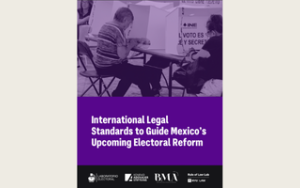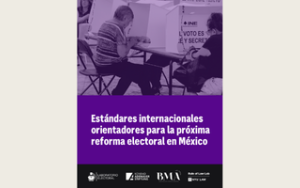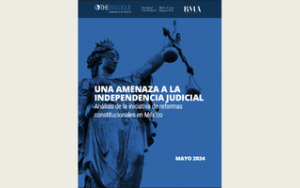Mexico
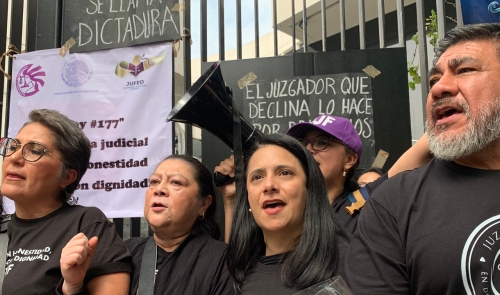
A Threat to Judicial Independence: Constitutional Reform Proposals in Mexico
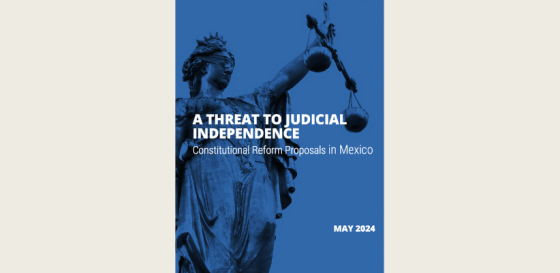
Featured
The Lab's Work in Mexico
Electoral Integrity
Electoral reforms in the 1990s and early 2000s strengthened Mexico’s electoral institutions and made the electoral process more transparent and competitive. The Federal Electoral Institute (IFE), established in 1990, and its 2014 successor, the National Electoral Institute (INE), have been crucial for ensuring that elections are conducted fairly and freely. Indeed, INE—an autonomous body charged with organizing, implementing, and monitoring Mexican elections–is widely regarded as one of the most effective and independent electoral commissions in the world. In recent years, however, President Andrés Manuel López Obrador and his party, Morena, have sought to undermine INE’s independence.
Freedom of Expression
On January 12, 2024, the Rule of Law Lab and Article 19-Mexico submitted an international law amicus brief in the first case before the Mexican Supreme Court to address the liability of internet intermediaries like Google for content posted online by third parties. The brief argues that affirming the lower court sanctions imposed on Google for not removing online content at the request of a third party, with neither a law nor a court order requiring such removal, and without any consideration of the right to freedom of expression on the internet, would set a troubling precedent. It would violate the free expression provisions of Article 13 of the American Convention on Human Rights and Article 19 of the International Covenant on Civil and Political Rights, while empowering financially-motivated private corporations like Google to act as censoring authorities without required safeguards of transparency, due process, and accountability.
Judicial and Prosecutorial Independence and Accountability
In 2024, autocratically-inclined President Andrés Manuel López Obrador proposed an overhaul of the Mexican judiciary that would replace all sitting state and federal judges—including those of the Supreme Court—with those elected by popular vote. Through extensive legal analysis, court submissions, public reports, media coverage, and presentations to key stakeholders, the Lab continues to inform the debate on the adverse consequences of this overhaul.
All Work
International Legal Standards to Guide Mexico’s Upcoming Electoral Reform (Report, January 2026)
Estándares internacionales orientadores para la próxima reforma electoral en México (Report, January 2026)
A Threat to Judicial Independence: Constitutional Reform Proposals in Mexico (Report, May 2024)
Una Amenaza a la Independencia Judicial: Análisis de la iniciativa de reformas constitucionales en México (Informe, mayo de 2024)
Brief with the Mexican Bar Association (Barra Mexicana Colegio de Abogados, A.C.) on draft Amparo Law by the Rule of Law Lab at NYU Law School (Brief, Read in Spanish)
--
The following publications were published under the auspices of the Rule of Law Impact Lab at Stanford Law School prior to July 2025. If you would like a copy, please email: ruleoflawlab@law.nyu.edu.
- Brief on behalf of the Mexican Bar Association (Barra Mexicana Colegio de Abogados, A.C.) by the Rule of Law Impact Lab at Stanford Law School
The SLS Rule of Law Impact Lab and the Mexican Bar Association filed an amicus curiae brief before the Mexican Supreme Court in lawsuits challenging the constitutionality of the judicial reform that would replace nearly 7000 sitting judges with those elected by popular vote. The brief argues that the reform violates Mexico’s international human rights obligations. The challenged judicial reform violates international standards relating to participation in public affairs, as well as those relating to judicial independence and due process.
Date Released: November 4, 2024
- Brief on behalf of Frank La Rue by the Rule of Law Impact Lab at Stanford Law School
On June 19th, the Stanford Rule of Law Impact Lab respectfully shared the reasons why the disciplinary proceedings and sanctions imposed on Prosecutor Rafael Ernesto Vela violate Peru’s obligations under Articles 8 and 13 of the American Convention on Human Rights and Article 19 of the International Covenant on Civil and Political Rights. This brief was submitted on behalf of Frank La Rue, the former U.N. Special Rapporteur on the Promotion and Protection of the
Right to Freedom of Opinion and Expression.
Date Released: June 19, 2024
- Brief on behalf of Article 19-Mexico by the Rule of Law Impact Lab at Stanford Law School
The SLS Rule of Law Impact Lab and Article 19-Mexico submitted an international law amicus brief in the first case before the Mexican Supreme Court to address the liability of internet intermediaries like Google for content posted online by third parties. The brief argues that affirming the lower court sanctions imposed on Google for not removing online content at the request of a third party, with neither a law nor a court order requiring such removal, and without any consideration of the right to freedom of expression on the internet, would set a troubling precedent. It would violate the free expression provisions of Article 13 of the American Convention on Human Rights and Article 19 of the International Covenant on Civil and Political Rights, while empowering financially-motivated private corporations like Google to act as censoring authorities without required safeguards of transparency, due process, and accountability.
Date Released: January 12, 2024
- Brief of Mexican Bar Association Filed by Stanford Law School Rule of Law Impact Lab
This amicus curiae brief was filed by the Stanford Law School Rule of Law Impact Lab on behalf of the Mexican Bar Association before the Mexican Supreme Court in the pending lawsuit challenging legislation (also known as “Plan B”) undermining the independence of Mexico's highly regarded Instituto Nacional Electoral (National Electoral Institute) or INE. The brief underscores the Court's role in protecting Mexico's democracy. It also argues that the legislation violates Mexico's international obligations related to the democratic principle, the right to vote and to participate in the conduct of public affairs through free and fair elections; Mexico's international obligation to adopt the necessary measures to give effect to such rights; and Mexico's international obligation to guarantee the independence of electoral management bodies.
Date Released: May 26, 2023
El Pais: A chance to support Mexico’s resistance to democratic decline – before it’s too late (News)
The New York Times: Electing Judges in Mexico? It’s a Bad Idea. (News)
Journal of Democracy: Mexico's democratic disaster (News)
---
The following press releases were published under the auspices of the Rule of Law Impact Lab at Stanford Law School prior to July 2025. If you would like a copy, please email: ruleoflawlab@law.nyu.edu.
Pause on the Telecommunications Bill: A Democratic Opportunity to Protect Free Expression
The Mexican Bar Association and the Rule of Law Impact Lab at Stanford Law School commend the decision to pause the legislative process of the proposed Telecommunications and Broadcasting Law, in order to allow for a broader and more informed discussion.
La Barra Mexicana, Colegio de Abogados, y el Laboratorio de Impacto del Estado de Derecho de la Facultad de Derecho de Stanford expresamos nuestro reconocimiento a la decisión de pausar el proceso legislativo de la iniciativa de Ley en Materia de Telecomunicaciones y Radiodifusión, para
permitir una discusión más amplia e informada.
Date Released: May 4, 2025
Federal Electoral Tribunal’s Violation of Supreme Court Injunction and Exclusion of Judicial Branch Nomination Commission Confirms that the Implementation of Mexico’s Judicial Reform is Deeply Flawed
La violación de la suspensión de la Suprema Corte por parte del Tribunal Electoral y la exclusión del Comité de Evaluación del Poder Judicial de la Federación confirman que la implementación de la reforma judicial en México es profundamente problemática
Date Released: January 29, 2025
Joint Statement on Mexico’s Constitutional Amendment Threatening Judicial Independence
The Mexican Bar Association and the Rule of Law Impact Lab at Stanford Law School express grave concerns over Mexico’s recent constitutional amendment that replaces nearly 7,000 judges with elected ones, threatening judicial independence and the rule of law.
Date Released: September 16, 2024
An Independent and Adequately Funded Judiciary is Crucial for Upholding the Rule of Law in Mexico
An independent and adequately funded judiciary is crucial for upholding the rule of law in Mexico. Accordingly, the Mexican Bar Association and the Stanford Law School Rule of Law Impact Lab call on the Mexican Chamber of Deputies to reject the proposed substantial budget cut.
Date Released: September 25, 2023


